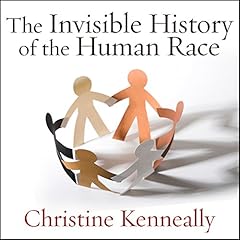
Who We Are and How We Got Here
No se pudo agregar al carrito
Add to Cart failed.
Error al Agregar a Lista de Deseos.
Error al eliminar de la lista de deseos.
Error al añadir a tu biblioteca
Error al seguir el podcast
Error al dejar de seguir el podcast
 Exclusivo para miembros Prime: ¿Nuevo en Audible? Obtén 2 audiolibros gratis con tu prueba.
Exclusivo para miembros Prime: ¿Nuevo en Audible? Obtén 2 audiolibros gratis con tu prueba.Compra ahora por $20.78
-
Narrado por:
-
John Lescault
-
De:
-
David Reich
A groundbreaking book about how ancient DNA has profoundly changed our understanding of human history
Geneticists like David Reich have made astounding advances in the field of genomics, which is proving to be as important as archaeology, linguistics, and written records as a means to understand our ancestry.
In Who We Are and How We Got Here, Reich allows listeners to discover how the human genome provides not only all the information a human embryo needs to develop but also the hidden story of our species. Reich delves into how the genomic revolution is transforming our understanding of modern humans and how DNA studies reveal deep inequalities among different populations, between the sexes, and among individuals. Provocatively, Reich's book suggests that there might very well be biological differences among human populations but that these differences are unlikely to conform to common stereotypes.
Drawing upon revolutionary findings and unparalleled scientific studies, Who We Are and How We Got Here is a captivating glimpse into humankind - where we came from and what that says about our lives today.
A New York Times best-seller in Science Books. A #1 Amazon.com bestseller in the Biochemistry List.
©2018 David Reich (P)2018 Blackstone Audio, Inc.Los oyentes también disfrutaron:




















Las personas que vieron esto también vieron:


















✔️ Outstanding ‼️
Se ha producido un error. Vuelve a intentarlo dentro de unos minutos.
The narrator is quite monotone, which to me, helps understanding the material but understandably might be a cause for boredom for some. You guessed it, this is not a funny book but a highly knowlegable and entertaining one.
Great book
Se ha producido un error. Vuelve a intentarlo dentro de unos minutos.
Highly informative and entertaining.
Se ha producido un error. Vuelve a intentarlo dentro de unos minutos.
It is quite technical at times, for those unfamiliar with genetic studies, but on the whole should be quite enjoyable for most audiences.
Fantastic Portrayal of New Advances
Se ha producido un error. Vuelve a intentarlo dentro de unos minutos.
Fascinating
Se ha producido un error. Vuelve a intentarlo dentro de unos minutos.


